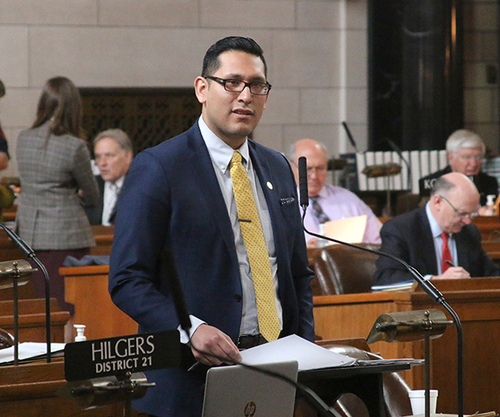Dispute over inspector general powers appears headed for legal interpretation

LINCOLN — Is it “constitutional overreach” to have special investigators assigned by the State Legislature look into problems, even deaths and injuries, involving state agencies?
A long-running dispute over whether there’s a separation of powers problem with state “inspector general” offices was renewed Friday during a legislative hearing. It came during a public hearing on a bill designed to clarify the powers of the Offices of the Inspector General for Child Welfare and Corrections.

On Monday, the sponsor of Legislative Bill 215, State Sen. Tom Briese of Albion, said he plans to hold onto the proposal because he’s expecting another state lawmaker to seek a legal opinion on the separation of powers issue from the Nebraska Attorney General’s Office.
“We’re not going to rush it to floor, put it that way,” said Briese, who chairs the Legislature’s Executive Board. “Some of this might hinge on an AG’s opinion.”
The Legislature created the Inspector General for Child Welfare in 2012 after a crisis in the state’s child welfare system.
Critical source of disclosure
The office has been a critical source of public disclosure involving problems associated with the privatization of child welfare, deaths at the state’s Youth Rehabilitation and Treatment Centers and the pricey mistake in awarding a child welfare contract to St. Francis Ministries.
The Inspector General for Corrections’ office was created in 2015 in the wake of the mistaken, early release of dozens of prison inmates and the release of Nikko Jenkins, a mentally troubled inmate who killed four people shortly after leaving a solitary confinement cell.
During the public hearing Friday, Briese and some other members of the Executive Board defended the inspectors general’s watchdog function and the Legislature’s need to know that state agencies, and even state judges, are functioning appropriately.

“It’s helpful information that’s good to have,” said Omaha Sen. Tony Vargas, citing state budgetary decisions.
Officials with the two inspector general offices testified that they had made dozens of recommendations over the years and that their work, which includes annual reports and reports on specific incidents, has led to improvements in the treatment of children who are state wards and inmates incarcerated in state prisons.
“The Legislature, the agencies we work with and the public have all benefited from our work,” said Doug Koebernick, the inspector general for Corrections.
He and other advocates for LB 215 said it was mostly a “cleanup bill” that clarified powers that are already recognized.
But officials with the Nebraska Judiciary and the Health and Human Services Department renewed past complaints that the inspector general’s offices represented “constitutional overreach” by the legislative branch.
Such internal watchdogs came under attack during the administration of President Donald Trump, with the firing of at least five federal inspectors general. There was no indication, however, that complaints about powers of Nebraska’s inspector generals were related.

State Court Administrator Corey Steel said allowing an inspector general to “investigate and question judges’ court orders pertaining to juvenile cases raises grave constitutional concerns.”
The “independence” of the judiciary is essential, Steel said, and to give the legislative branch investigatory powers over it was “constitutional overreach.”
He said that the judicial branch has always held that opinion but felt that LB 215 would extend problems even further.
Bo Botelho, chief legal counsel with HHS, raised similar objections.
He said the agency is in the process of developing its own “office of compliance” to investigate problems within Health and Human Services.
La Vista Sen. John Arch, a former hospital administrator, questioned how “robust” such internal scrutiny would be.
“The issue we have with oversight is so we don’t find out two years later that children were injured under your jurisdiction,” Arch said.
Sen. Julie Slama of Sterling, however, said she was concerned that if a state probation officer failed to answer questions from an IG at the advice of an attorney, the officer could face consequences.
The Executive Board took no action on LB 215 after the public hearing Friday. The bill is similar to one introduced by then-State Sen. Steve Lathrop last year that failed to advance.








